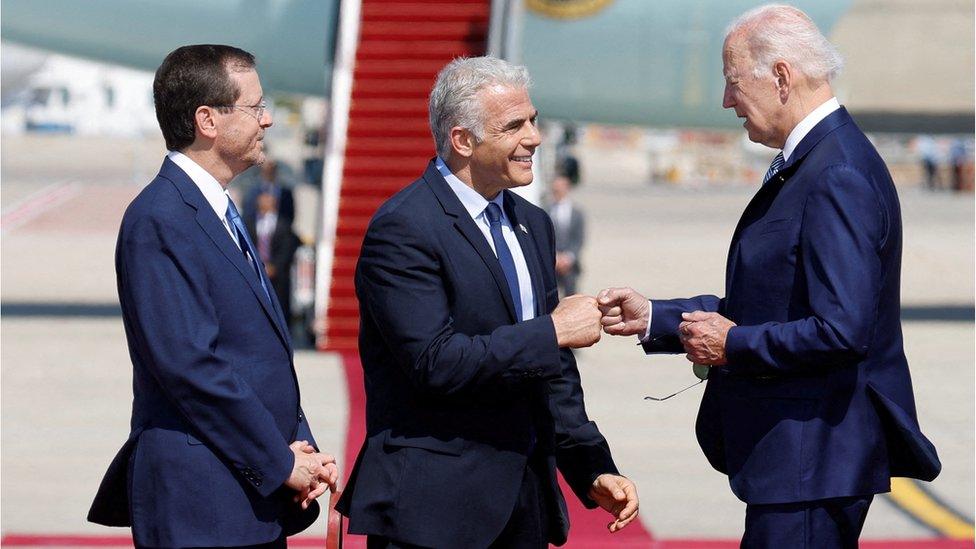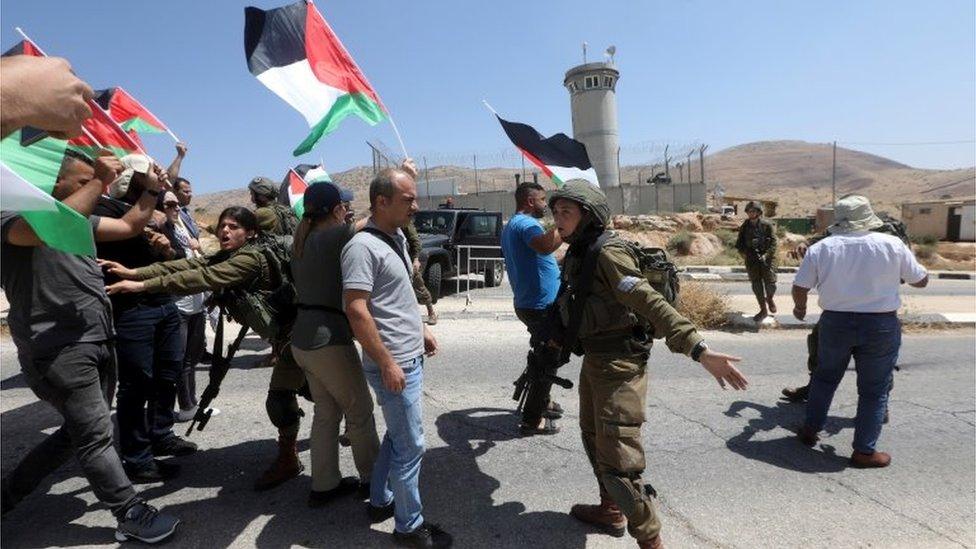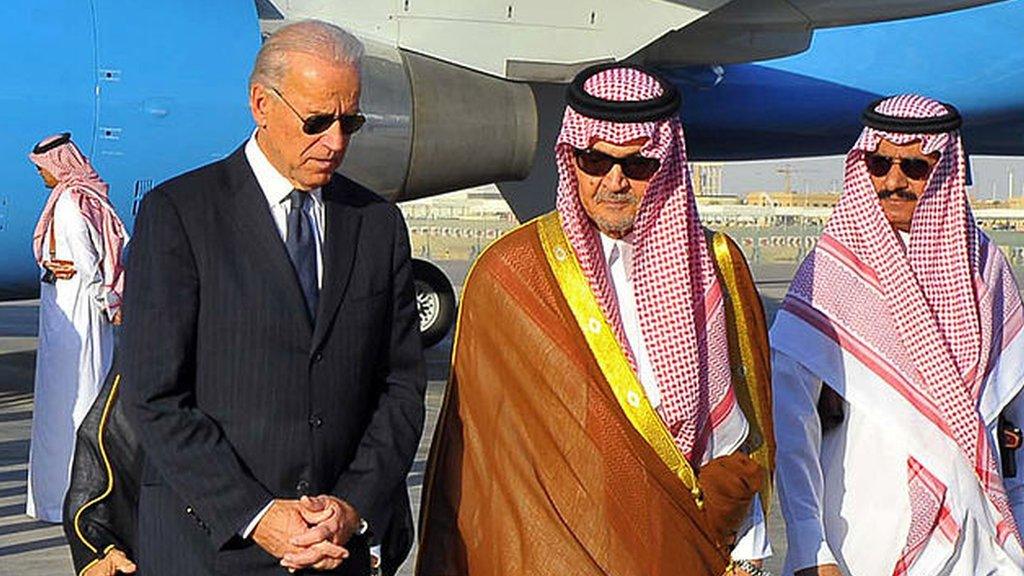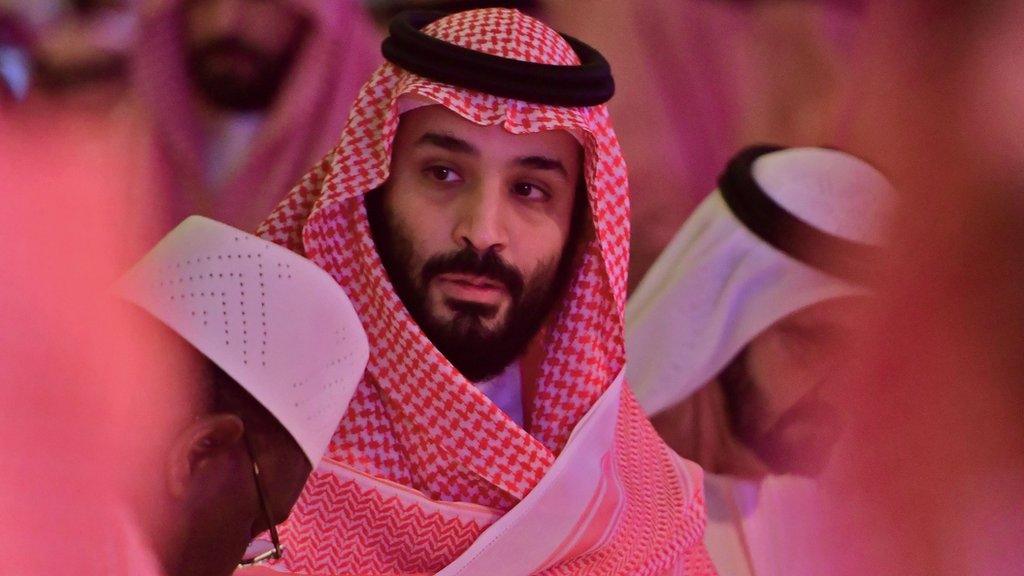Biden visits Israel ahead of thorny Saudi Arabia trip
- Published

Joe Biden was greeted by Israel's President Isaac Herzog (L) and Prime Minister Yair Lapid (C)
US President Joe Biden is visiting Israel at the start of a landmark regional tour, which will include a controversial trip to Saudi Arabia.
It is his first journey to the Middle East since taking office. Mr Biden will also meet the Palestinian president as well as Israeli and Saudi leaders.
Palestinians have expressed frustration that the US has not done more for them since his presidency began in 2021.
But the main focus will be on his Saudi trip due to tensions over human rights.
Mr Biden has faced criticism over his planned meeting on Saturday with the kingdom's de facto leader, Crown Prince Mohammed bin Salman, who was accused by US intelligence agencies of approving the murder of Saudi dissident journalist Jamal Khashoggi in Turkey in 2018. The prince denied the allegations, and Saudi prosecutors blamed "rogue" Saudi agents.
When he was campaigning for the presidency in 2019, Mr Biden vowed to make Saudi Arabia "the pariah that they are" for killing Khashoggi, who lived in the US and wrote a column for the Washington Post.
Mr Biden defended his visit in an op-ed in the Washington Post on Saturday, external, saying his "aim was to reorient - but not rupture - relations" with Riyadh.
The visit also comes at a time of rising oil prices, and energy production is expected to be on the agenda of the discussions between Mr Biden and Prince Mohammed, whose country is the world's biggest oil producer.
The president and his Secretary of State, Antony Blinken, will attend a regional summit in Saudi Arabia, amid reports that the US is seeking agreement on closer defence co-operation between Israel and several Arab states - some of them old foes - to counter the threat from Iran.
Mr Biden will become only the second US president to fly directly to Saudi Arabia from Israel, which is seen as a small but significant sign of Riyadh's growing acceptance of Israel after decades of boycott in solidarity with the Palestinians.
Israel's Prime Minister Yair Lapid has said Mr Biden's plane will "carry with it a message of peace and hope from us" to the Saudis.

Expectations of any significant development between Israel and the Palestinians are low
After landing at Tel Aviv's Ben Gurion airport on Wednesday afternoon, the president headed down the steps of Air Force One to be greeted by Israel's leadership, including Mr Lapid.
As handshakes were offered, Mr Biden instead fist-bumped Mr Lapid and Israel's President Isaac Herzog. He later shook hands with Israeli opposition leader Benjamin Netanyahu and Defence Minister Benny Gantz.
On the red carpet Mr Biden spoke of the "bone-deep" connection between Americans and Israelis, saying: "You don't need to be a Jew to be a Zionist" - a reference to the political movement underpinning Israel's existence.
He also spoke of his continued support for the so-called two state solution to the Israeli-Palestinian conflict, which envisages an independent Palestinian state alongside Israel, though he noted: "I know it's not in the near term."
The US president will meet Mr Lapid again on Thursday for talks, during which the two leaders are expected to discuss security co-operation and the nuclear crisis with Iran.
Mr Biden favours a US return to the 2015 Iranian nuclear deal, which was abandoned by his predecessor Donald Trump four years ago. Israel, which considers Iran its biggest threat, wants the Iranian nuclear programme stopped. Iran says its nuclear activities have always been entirely peaceful, but Western powers and the global nuclear watchdog say they are not convinced.
On Friday, Mr Biden will hold talks with Palestinian President Mahmoud Abbas in Bethlehem, in the occupied West Bank.
It will be the highest level meeting between the US and the Palestinians since the Palestinians froze ties in a dispute over the closure of the Washington office of the Palestine Liberation Organisation (PLO) - the main representative body of the Palestinians - by the Trump administration in 2018.
The Palestinians want the US to do more to re-start peace talks with Israel and to reopen the US consulate in Jerusalem, which served as a de facto embassy to the Palestinians before it was shut by the Trump administration in 2019.
However, Mr Lapid is not expected to make diplomatic overtures towards the Palestinians ahead of the Israeli general election in November, and the Biden administration has said it is not yet ready reverse the US consulate's closure.

You may also be interested in:
Watch: Guns and grief on the rise in the West Bank
Correction 28 July 2022: An earlier version of this story incorrectly stated that President Biden was set to become the first US president to fly directly from Israel to Saudi Arabia.
- Published14 June 2022

- Published14 July 2021
